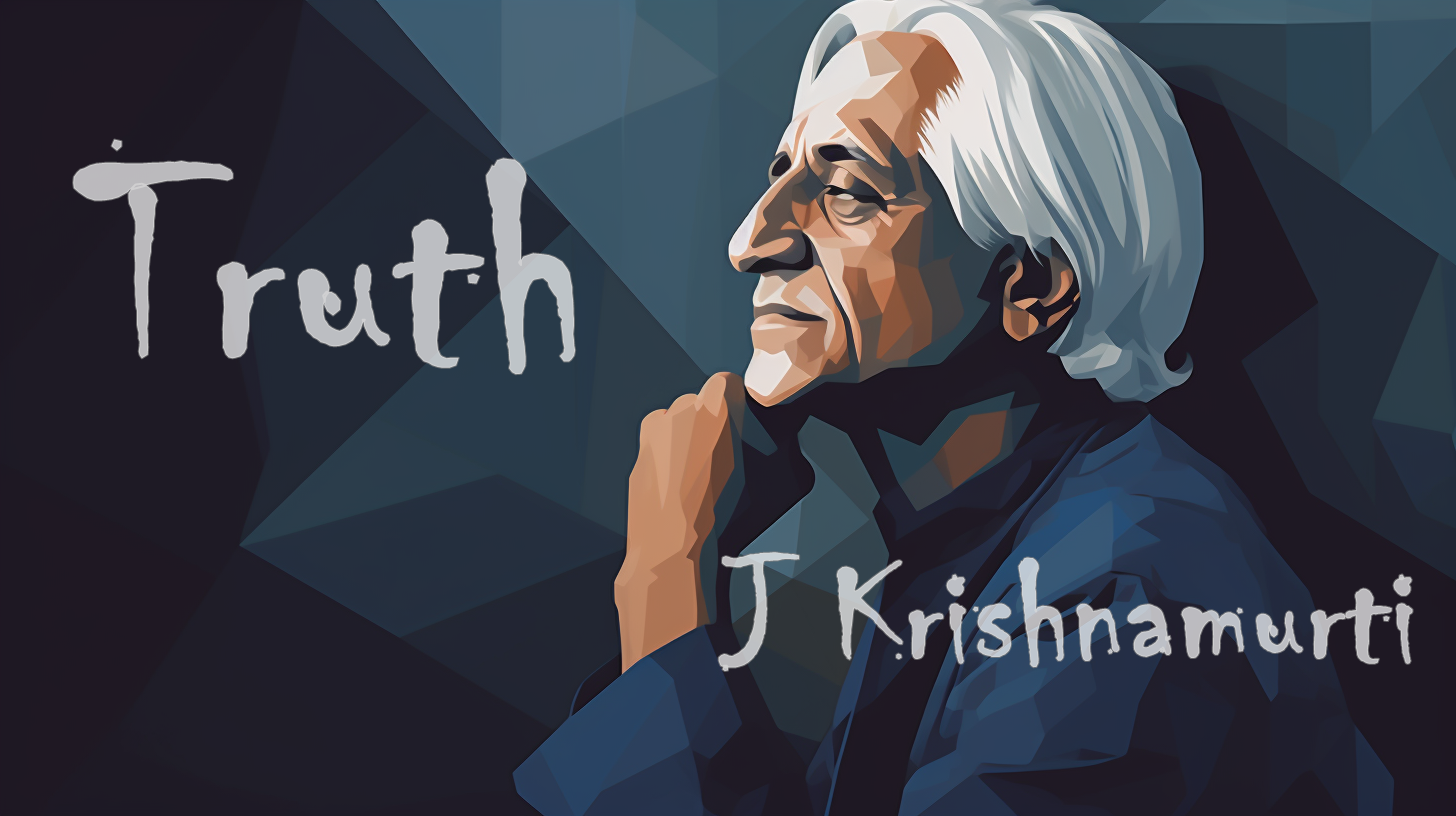Truth Is a State of Being
There is only one truth, and there are no alternate realities. Truth is timeless; therefore, a man who parrots the words of the Buddha, Shankara, or Christ, or who merely reiterates what I have said, will not discover the truth. Repetition is not truth. A lie is repeated. When the mind, which wants to separate, to be exclusive, and which can only think in terms of outcomes or accomplishments, has come to an end, truth emerges as a state of being. The truth will emerge only then. Because the end is its own projection and the pursuit of that projection, however good, is a sort of self-worship, the mind that is exerting effort and self-disciplining itself in order to reach a goal is unable to know reality. Such a being worships himself, hence he is unable to comprehend reality. Only when we comprehend the entire mental process, or when there is peace, can we know the truth.
Truth Has No Abiding Place
Truth is a fact, and it can only be grasped once all of the obstacles that have been put in the way of the mind and the fact have been taken away. The reality is that you are in a relationship with your possessions, your wife, other people, nature, and ideas. As long as you do not comprehend this reality, your search for God will only add to the confusion because it is a crutch and has no real purpose. You cannot understand love as long as you control your wife or she controls you, as long as you own and are possessive, and you cannot understand truth as long as you are repressing, substituting, or ambitious.
Only the person who is not looking for something or trying to get something will know the truth. Truth can only be observed moment by moment; it is not continuous and has no permanent location. Truth is ageless because it is continuously evolving. Neither what was true yesterday nor what is true today will be true tomorrow. The truth is not continuous. The mind seeks to make the experience it refers to as truth ongoing, and such a mind is unable to comprehend reality. Truth is always fresh; it is to see the same grin and notice it newly; to notice the same person and notice them fresh; to notice the waving palms fresh; and to encounter life fresh.
There Is No Guide to Truth
Is it possible to find God through looking for him? Are you able to look for the unknown? To find, you must be aware of your search criteria. If you look for anything, you will project your own desires onto it, which is not what you will actually find. In search of the truth is to reject it. The word is not truth; it has no fixed abode; no path leads to it; and there is no guide to it. Is truth only to be found in specific places, in particular climatic conditions, and among specific people? Is it both there and here? Is that and not another the path to truth? Is there even a guide?
When truth is sought, what is discovered can only result from ignorance because ignorance is the root of the quest. Reality cannot be sought after; you must let go in order for reality to exist.
Truth Is Found Moment to Moment
There is no accumulating truth. What builds up is always being destroyed; it deteriorates. Since truth can only be discovered moment by moment in every idea, connection, word, gesture, smile, and cry, truth can never fade. And if you and I can discover that and live it—the mere act of living is the discovery of it—then we won’t turn into propagandists; instead, we’ll be creative humans—not perfect humans, but creative humans, which is a completely different kind of person.
The True Revolutionary
Truth is not for the respectable or those who seek self-fulfillment or self-extension. Truth is not for people looking for stability or permanence since what they want is simply the opposite of impermanence. They desire permanence because they are entangled in the web of time, yet the permanence they seek is not the reality because it is a creation of their minds. So, in order to find truth, a man must give up seeking—this does not imply that he must be satisfied with what is.
On the other hand, a guy who is dedicated to the search for the truth must be an internalised revolutionary. Because truth cannot be found in the temple or the church, nor can it be found in things created by the hand or the mind, he is unable to belong to any class, nation, group, philosophy, or organised religion. Only when the things of the intellect and the things of the hand are set aside does truth come into being, and this setting aside is not a matter of time. He who has no use for time and does not extend his or her own life receives the truth. Time is the collection of memories from the past, including memories of your family, your race, your unique personality, and the experiences that make up the “me” and the “mine.”
See the Truth in the False
When it is argued that nationalism, with all of its emotionalism and entrenched interests, leads to exploitation and the pitting of man against man, you may agree on the surface, but it is another thing entirely to truly free your mind from the pettiness of nationalism. If the mind is to be young, fresh, and innocent, that is, in a state of revolution, it must be free—not only from nationalism but also from all the conclusions of organised religions and political systems. Only such a mind can create a new world; neither the politicians who are dead nor the priests who are enmeshed in their own religious systems.
You have heard something that is true, which is either lucky or unfortunate for you, but if you simply hear it without actively being disturbed so that your mind starts to untangle itself from everything that is making it narrow and twisted, then the truth you have heard will turn into poison. Truth undoubtedly turns into poison if it is heard but does not affect the mind like a sore that is allowed to fester. However, in order to determine for oneself what is real and what is false and to see the truth in the false, one must first allow the truth to exist and take on life on its own.
Understand the Actual
Although it might be difficult, it is really not that complicated. You see, we start with presumptions or ideals, which are not actualities, and as a result we are misled. We start with the actual, with the fact, with what we are thinking, doing, and wishing. We need to pay close attention if we want to start with facts rather than assumptions, and any thought that does not come from the actual is a distraction. It is crucial to comprehend what is truly happening both inside and outside of one because of this.
Your visions have a pattern if you’re a Christian; if you’re a Hindu, Buddhist, or Muslim, they have a different pattern.
Depending on your upbringing and conditioning, you may perceive Christ or Krishna; your visions are shaped by your education and the culture in which you were raised. The perception or the mind that has been moulded into a certain shape—which is reality? The vision is a reflection of the specific tradition that serves as the mind’s background. The reality, the fact, is this conditioning rather than the vision it projects. The fact is easy to understand, but our preferences, condemnations of the fact, and views or assessments of the fact make it more challenging. Understanding the real, the what is, is what it takes to be free of these numerous types of evaluation.
There Is Only One Fact: Impermanence
We are attempting to determine whether or not there is a permanent state—not what we would like to believe, but the reality, the truth of the situation.
Everything about us, both inside and outside—our relationships, thoughts, and feelings—are transient and always changing.
Knowing this, the mind yearns for permanence, a state of unending happiness, love, and goodness, a sense of security that neither time nor circumstances can shatter; as a result, it develops the soul, the Atman, and ideas of an eternal paradise. However, because impermanence gave birth to this permanence, it carries the seeds of the transient within it.
Impermanence stands out as the only reality.
Hankering After the Unknowable
You ask me to inform you of reality. Can words describe the indescribable? Can you quantify the unmeasurable? Can you clench your fist and catch the wind? Do you feel the breeze if you do? Is the real what you get if you measure the unmeasurable? Is it true if you put it in words? No, of course not, since the moment you attempt to define the ineffable, it ceases to exist. The unknowable no longer remains unknowable once it has been translated into the familiar. However, that is what we want for. We are constantly curious because we believe that once we know, we would be able to keep going and achieve permanent happiness. We want to know the answer because we are unhappy, struggling valiantly, exhausted, and debased. However, we desire to move away from what is the known into the unknown, which again becomes the known, and so we can never find the genuine. Instead of accepting the basic fact that we are degraded, that we are bored, weary, and in turmoil.

